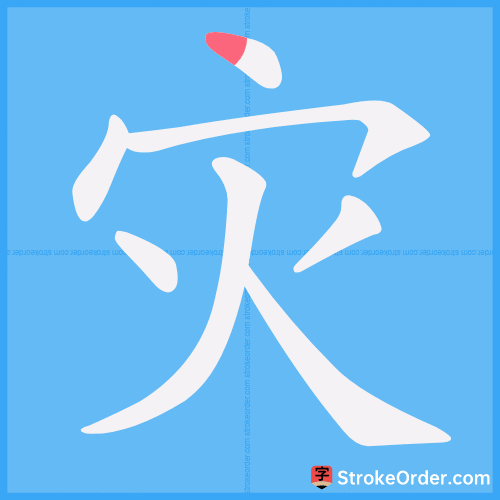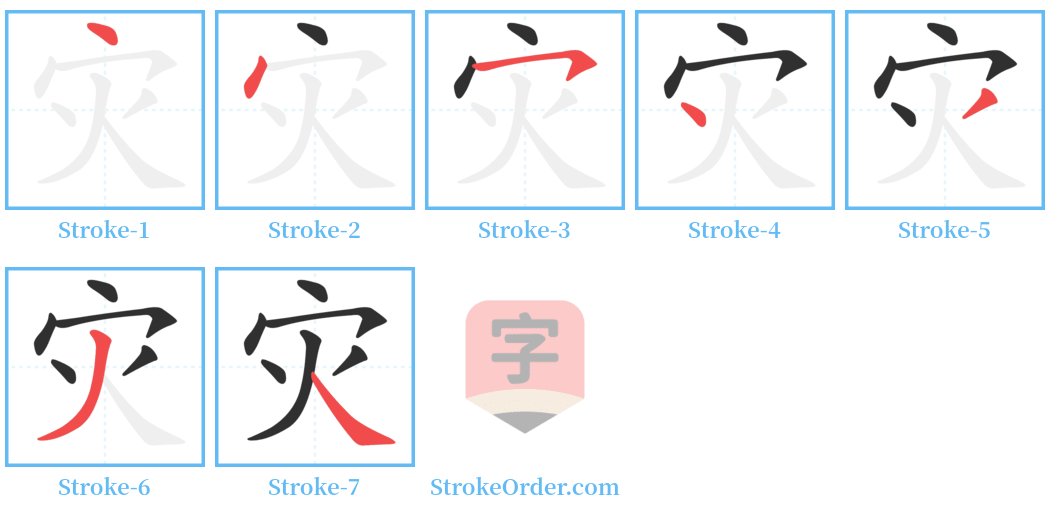灾 Stroke Order
Animated Stroke Order of 灾

Stroke Order Diagrams for 灾

Step-by-Step Handwriting Guide for 灾

Learn to Write Chinese Characters with Video Tutorials
Watch the video of writing the Chinese character "灾", learn the correct stroke order (笔顺) of the character "灾", and master the standard way of writing the character "灾".
Free Printable Handwriting Practice with Stroke Order: 灾
Printable Writing Practice Worksheet of "灾" in Portrait Orientation (Tian Zi Ge)

Printable Writing Practice Worksheet of "灾" in Landscape Orientation (Tian Zi Ge)

Information of 灾
Pinyin
zāi
Radical
火
Strokes
7 strokes
Usage
★★★★★
Definition
disaster / calamity
灾
zāi
1. Water, fire, drought, etc., causing harm.
水、火、荒旱等所造成的祸害。
2. Unfortunate experiences of individuals.
个人的不幸遭遇。
---
1. Water disaster (水灾).
2. Fire disaster (火灾).
3. Disaster (灾难).
4. Harm (灾害).
5. Suffering (灾患).
1. Same as the original meaning (火灾).
同本义 ([En.] fire as a disaster)
2. Disaster, calamity, catastrophe.
灾害,祸患 ([En.] disaster; calamity; catastrophe)
3. Evil (罪恶).
罪恶 ([En.] crime)
---
1. To injure, cause harm.
伤害,使受灾害 ([En.] injury)
2. To burn.
焚烧 ([En.] burn)
3. See also zī.
另见 zī
---
本义: 火灾
Original meaning: Fire disaster
造字法: 会意。甲骨文字形,象火焚屋的形状。小篆从川,表水; 从火。水火都是灾祸之源。
Character formation method: Ideographic. The oracle bone script represents the shape of a house burning. The small seal script indicates water (川) and fire. Water and fire are sources of disasters.
---
引:
1. "Shuōwén": Heavenly fire is called 烖, from fire, with the sound of "zāi". In ancient texts it is expressed as "才", with "川" as the sound. Sometimes it indicates disaster.
《说文》:天火曰烖,从火,哉声。古文从才,籀文从巛声。或体灾。
2. "Gōngyáng Zhuàn": The greater is called disaster, the lesser fire.
《公羊传·襄公九年》:大者曰灾,小者火。
3. "Gùliáng Zhuàn": The country is called disaster, the city is called fire.
《谷梁传·昭公九年》:国曰灾,邑曰火。
4. "Shìmíng": The remnants burned by fire are called 烖, indicating that the remaining items are such.
《释名》:火所烧灭之余曰烖,言其余物如是也。
5. "Zuǒ Zhuàn": All fires, human fire is called fire, heavenly fire is called disaster.
《左传·宣公十六年》:凡火,人火曰火,天火曰灾。
6. "Zuǒ Zhuàn": In the fourth month of summer, there was a disaster in Chen.
《左传·昭公九年》:夏四月,陈灾。(陈地发生火灾。)
例: 例如: 灾火 (fire disaster); 灾燀 (fire disaster).
Examples: For instance, disaster fire (灾火); disaster flames (灾燀).
---
灾害,祸患 ([En.] disaster; calamity; catastrophe)
引:
1. "Zhōulǐ": Great烖. Note: "Water and fire are harmful."
《周礼·司服》:大烖。注:“水火为害。”
2. "Zhōulǐ": Disaster caused by war, water, and fire.
《周礼·掌客》:祸烖杀礼。注:“新有兵寇水火也。”
3. "Zhōulǐ": When a country has a great calamity, heavenly fire descends.
《周礼·大祝》:国有大故天烖。注:“疫疠水旱也。”
4. "Xúnzǐ": Disaster befalls its body.
《荀子·臣道》:灾及其身。
5. "Guóyǔ": Heavenly disaster falls harshly.
《国语·周语》:天灾降戾。(戾:猛,凶)
例: 例如: 灾晦 (disaster; misfortune); 灾燀 (disaster; calamity).
Examples: For instance, disaster misfortune (灾晦); disaster flames (灾燀).
---
罪恶 ([En.] crime)
引:
1. "Gùliáng Zhuàn": Disaster is to record and manage. Nìng annotation: "Disaster means crime; record means governance."
《谷梁传》:灾,纪也。范宁注:“灾,谓罪恶;纪,治理也。”
---
1. To injure, cause harm.
伤害,使受灾害 ([En.] injury)
引:
1. "Lùn héng": When a lord fails to govern, heaven acts differently; if unmodified, it disasters the people; if unmodified, it will ultimately disaster himself.
《论衡》:人君失政,天为异;不改,灾其人民;不改,乃灾其身也。
2. To burn.
焚烧 ([En.] burn)
引:
1. "Hànshū": Reckless flames arise, damaging ancestral halls, burning palaces.
《汉书》:滥炎妄起,灾宗庙,烧宫馆。
3. Another reference: zī.
另见 zī
lit. to take joy in calamity and delight in disaster (idiom); fig. to rejoice in other people's misfortune / Schadenfreude
earthquake relief work / combat the quake and carry out relief work / carry out (one's) antiquake struggle and relief work / combat the earthquake and do relief work
Input Method for 灾
Pinyin
zai1
Wubi
pou
Cangjie
jf
Zhengma
wduo
Four Corner
30809
Unicode
U+707e